|
Books Should Be Free Loyal Books Free Public Domain Audiobooks & eBook Downloads |
|
|
Books Should Be Free Loyal Books Free Public Domain Audiobooks & eBook Downloads |
|
Fiction |
|---|
|
Book type:
Sort by:
View by:
|
By: Charles Dickens (1812-1870) | |
|---|---|
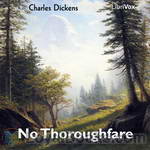 No Thoroughfare
No Thoroughfare
Two boys from the Foundling Hospital are given the same name, with disastrous consequences in adulthood. Two associates, wishing to right the wrong, are commissioned to find a missing heir. Their quest takes them from fungous wine cellars in the City of London to the sunshine of the Mediterranean — across the Alps in winter. Danger and treachery would prevail were it not for the courage of the heroine and the faithful company servant. The story contains crafted descriptions, well-drawn and diverse... | |
 A House to Let
A House to Let
A House to Let is a novella originally published in 1858 in the Christmas edition of Dickens’ Household Words magazine. Each of the contributors wrote a chapter (stories within a story, and in the case of Adelaide Anne Procter, as a story in verse) and the whole was edited by Dickens. The plot concerns an elderly woman, Sophonisba, who notices signs of life in a supposedly empty dilapidated house (the eponymous “House to Let”) opposite her own, and employs the efforts of an elderly admirer, Jabez Jarber, and her servant, Trottle, to discover what is happening within. | |
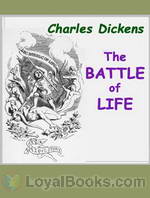 The Battle of Life
The Battle of Life
While "The Battle of Life" is one of Charles Dickens' Christmas Books - his annual release of a story just before Christmas - this one breaks the tradition by not being concerned with Christmas. Rather, its subtitle, "A Love Story", reveals more of the plot. The major events of this book take place on land that once was a battleground. That is just a backdrop for Dickens' idea of the real battle of life - finding and winning the right partner, so that life will go on to the next generation. The family that lives there is rather confused in its affections and intentions regarding who should end up with whom... | |
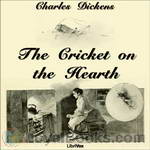 The Cricket on the Hearth
The Cricket on the Hearth
The tale of John Peerybingle, the good-hearted carrier, and his young wife Mary ('Dot'), interwoven with the story of poor toymaker Caleb Plummer, his beloved blind daughter Bertha, and the harsh old toy merchant Tackleton, who is due to marry May Fielding, a childhood friend of Dot. Comic relief is provided by Tilly Slowboy, the disaster-prone nursemaid of John and Dot's baby, and Boxer, the family dog.The cricket who chirps on the family hearth assumes fairy form to save the day when disaster looms in the form of a mysterious stranger... | |
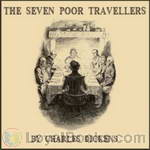 The Seven Poor Travellers
The Seven Poor Travellers
One of Dickens’ Christmas stories, this was first published as part of the Christmas number of Household Words for 1854. The first chapter relates Dickens’ visit to the ancient Richard Watts’s Charity at Rochester. The second chapter is the touching story of “Richard Doubledick”, which Dickens supposedly told the travellers, and Dickens’ journey home on Christmas morning provides the short concluding chapter. | |
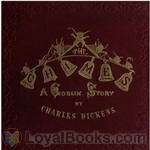 The Chimes
The Chimes
The Chimes: A Goblin Story of Some Bells that Rang an Old Year Out and a New Year In is the second of Charles Dickens' Christmas books, published in 1844. Its contemporary setting is the "Hungry Forties", a time of social and political unrest, and the book has a strong moral message. It remained popular for many years, although its fame has since been eclipsed by that of A Christmas Carol, the first of the series. Our hero Toby ("Trotty") Veck is a poor but hard-working man, whose beloved daughter Meg is due to marry on New Year's Day... | |
 The Haunted Man and the Ghost's Bargain
The Haunted Man and the Ghost's Bargain
The Haunted Man and the Ghost’s Bargain, A Fancy for Christmas-Time, (better known as The Haunted Man and the Ghost’s Bargain) is a novella by Charles Dickens first published in 1848. It is the fifth and last of Dickens' Christmas novellas. The story is more about the spirit of the holidays than about the holidays themselves, harking back to the first of the series, A Christmas Carol. The tale centers around a Professor Redlaw and those close to him. | |
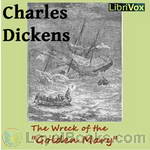 The Wreck of the Golden Mary
The Wreck of the Golden Mary
A short story of a ship wreck in 1851 trying to round Cape Horn on its way to the California gold fields. Poignant and well written. ( | |
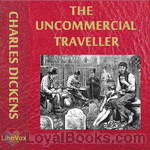 The Uncommercial Traveller
The Uncommercial Traveller
The Uncommercial Traveller is a collection of literary sketches and reminiscences written by Charles Dickens. In 1859 Dickens founded a new journal called All the Year Round and the Uncommercial Traveller articles would be among his main contributions. He seems to have chosen the title and persona of the Uncommercial Traveller as a result of a speech he gave on the 22 December 1859 to the Commercial Travellers' School London in his role as honorary chairman and treasurer. The persona sits well with a writer who liked to travel, not only as a tourist, but also to research and report what he found; visiting Europe, America and giving book readings throughout Britain... | |
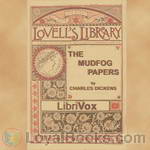 Mudfog and Other Sketches
Mudfog and Other Sketches
The Mudfog Papers was written by Victorian era novelist Charles Dickens and published from 1837–38 in the monthly literary serial Bentley's Miscellany, which he then edited. They were first published as a book as 'The Mudfog Papers and Other Sketches. The Mudfog Papers relates the proceedings of the fictional 'The Mudfog Society for the Advancement of Everything', a Pickwickian parody of the British Association for the Advancement of Science founded in York in 1831, one of the numerous Victorian learned societies dedicated to the advancement of Science... | |
 The Magic Fishbone A Holiday Romance
The Magic Fishbone A Holiday Romance
| |
 A Message from the Sea
A Message from the Sea
| |
 Captain Boldheart & the Latin-Grammar Master
Captain Boldheart & the Latin-Grammar Master
| |
 Lazy Tour of Two Idle Apprentices
Lazy Tour of Two Idle Apprentices
| |
 Mugby Junction
Mugby Junction
| |
 To Be Read at Dusk
To Be Read at Dusk
| |
 The Trial of William Tinkling
The Trial of William Tinkling
| |
 The Holly-Tree
The Holly-Tree
| |
 Doctor Marigold
Doctor Marigold
| |
 The Lamplighter; a farce in one act
The Lamplighter; a farce in one act
| |
 Somebody's Luggage
Somebody's Luggage
| |
 Tom Tiddler's Ground
Tom Tiddler's Ground
| |
 Reprinted Pieces
Reprinted Pieces
| |
 Perils of Certain English Prisoners
Perils of Certain English Prisoners
| |
 Mrs. Lirriper's Legacy
Mrs. Lirriper's Legacy
| |
 Going into Society
Going into Society
| |
 Mrs. Lirriper's Lodgings
Mrs. Lirriper's Lodgings
| |
 George Silverman's Explanation
George Silverman's Explanation
| |
 Mugby Junction
Mugby Junction
| |
By: Charles Dudley Warner (1829-1900) | |
|---|---|
 That Fortune
That Fortune
| |
 Little Journey in the World
Little Journey in the World
| |
 The Golden House
The Golden House
| |
By: Charles E. (Charles Emmett) Van Loan (1876-1919) | |
|---|---|
 Old Man Curry Race Track Stories
Old Man Curry Race Track Stories
| |
By: Charles E. Carryl (1841-1920) | |
|---|---|
 Davy and the Goblin
Davy and the Goblin
Eight-year-old Davy reads Lewis Carroll's novel Alice's Adventures in Wonderland and begins to get very sleepy. Suddenly a goblin appears in the fire and takes Davy on a "believing voyage" much like Alice's own adventures in Wonderland, where he meets many characters from fantasy and literature. | |
 The Admiral's Caravan
The Admiral's Caravan
| |
By: Charles Edward Pearce (-1924) | |
|---|---|
 Madame Flirt A Romance of 'The Beggar's Opera'
Madame Flirt A Romance of 'The Beggar's Opera'
| |
By: Charles Edward Rich | |
|---|---|
 A Voyage with Captain Dynamite
A Voyage with Captain Dynamite
| |
By: Charles Felton Pidgin (1844-1923) | |
|---|---|
 Quincy Adams Sawyer and Mason's Corner Folks A Picture of New England Home Life
Quincy Adams Sawyer and Mason's Corner Folks A Picture of New England Home Life
| |
 Further Adventures of Quincy Adams Sawyer and Mason Corner Folks
Further Adventures of Quincy Adams Sawyer and Mason Corner Folks
| |
By: Charles Franklin Carter | |
|---|---|
 Old Mission Stories of California
Old Mission Stories of California
| |
By: Charles Garvice (-1920) | |
|---|---|
 The Woman's Way
The Woman's Way
| |
 Adrien Leroy
Adrien Leroy
| |
 Nell, of Shorne Mills or, One Heart's Burden
Nell, of Shorne Mills or, One Heart's Burden
| |
By: Charles George Douglas Roberts (1860-1943) | |
|---|---|
 Children of the Wild
Children of the Wild
| |
By: Charles Goddard (1879-1951) | |
|---|---|
 The Perils of Pauline
The Perils of Pauline
The Perils of Pauline is one of the first damsel in distress serials. The story is complete with undaunted hero, courageous damsel, unscrupulous villains galore, and other worldly interest. Before getting married, Pauline wants to experience the world and have adventures. When her guardian dies and leaves her an estate in trust of his secretary, adventures suddenly become more hazardous. Pauline charters aeroplanes, meets untrustworthy pirates, braves dangerous China Town, flies in a hot air balloon, adventures in the Wild West, encounters international spies, and escapes many other perils with the aid of her would-be fiancé, Harry, and an Egyptian mummy. | |
By: Charles Goddard and Paul Dicky | |
|---|---|
 The Ghost Breaker
The Ghost Breaker
The Ghost Breaker is a drama and haunted house horror complete with heroes, villains, and a Princess. The Ghost Breaker was originally a screenplay and would later be made a drama film directed by Cecil B. DeMille. | |
By: Charles Goff Thomson | |
|---|---|
 Terry A Tale of the Hill People
Terry A Tale of the Hill People
| |
By: Charles H. Bennett (1829-1867) | |
|---|---|
 The Faithless Parrot
The Faithless Parrot
| |
 The Frog Who Would A Wooing Go
The Frog Who Would A Wooing Go
| |
 The Nine Lives of A Cat A Tale of Wonder
The Nine Lives of A Cat A Tale of Wonder
| |
By: Charles Hanson Towne (1877-1949) | |
|---|---|
 The Best Short Stories of 1921 and the Yearbook of the American Short Story
The Best Short Stories of 1921 and the Yearbook of the American Short Story
| |
 The Bad Man
The Bad Man
| |
By: Charles Henry Lerrigo (1872-1955) | |
|---|---|
 The Boy Scout Treasure Hunters The Lost Treasure of Buffalo Hollow
The Boy Scout Treasure Hunters The Lost Treasure of Buffalo Hollow
| |
By: Charles James Lever (1806-1872) | |
|---|---|
 The Confessions of Harry Lorrequer
The Confessions of Harry Lorrequer
| |
 Lord Kilgobbin
Lord Kilgobbin
| |
By: Charles K. (Charles Kellogg) Field (1873-) | |
|---|---|
 Stanford Stories Tales of a Young University
Stanford Stories Tales of a Young University
| |
By: Charles King | |
|---|---|
 The Daughter of the Sioux,
The Daughter of the Sioux,
Charles King (1844 – 1933) was a United States soldier and a distinguished writer. He was the son of Civil War general Rufus King and great grandson of Rufus King, one of the signers of the Declaration of Independence. He graduated from West point in 1866 and served in the Army during the Indian Wars under George Crook. He was wounded in the arm forcing his retirement from the regular army. During this time he became acquainted with Buffalo Bill Cody. King would later write scripts for several of Cody’s silent films... | |
 An Apache Princess A Tale of the Indian Frontier
An Apache Princess A Tale of the Indian Frontier
| |
 Sunset Pass or Running the Gauntlet Through Apache Land
Sunset Pass or Running the Gauntlet Through Apache Land
| |
 Tonio, Son of the Sierras A Story of the Apache War
Tonio, Son of the Sierras A Story of the Apache War
| |
 To The Front A Sequel to Cadet Days
To The Front A Sequel to Cadet Days
| |
 Marion's Faith.
Marion's Faith.
| |
 Under Fire
Under Fire
| |
 A Wounded Name
A Wounded Name
| |
 Foes in Ambush
Foes in Ambush
| |
 A Tame Surrender, A Story of The Chicago Strike
A Tame Surrender, A Story of The Chicago Strike
| |
 Found in the Philippines The Story of a Woman's Letters
Found in the Philippines The Story of a Woman's Letters
| |
 The Deserter
The Deserter
| |
 From the Ranks
From the Ranks
| |
 Lanier of the Cavalry or, A Week's Arrest
Lanier of the Cavalry or, A Week's Arrest
| |
 Waring's Peril
Waring's Peril
| |
By: Charles Kingsley (1819-1875) | |
|---|---|
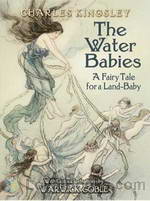 The Water-Babies
The Water-Babies
First published in 1863, The Water Babies by Rev Charles Kingsley became a Victorian children's classic along with J.M. Barrie's Peter Pan and Lewis Caroll's Alice books. It is an endearing and entertaining novel that can equally be enjoyed by adult readers as well. However, it fell out of favor in later years since it contained many ideas that are considered politically incorrect and offensive today from a humanitarian perspective. The Water Babies, A Fairy Tale for a Land Baby to give the book its complete title tells the story of Tom, a young orphan chimney-sweep in Victorian London... | |
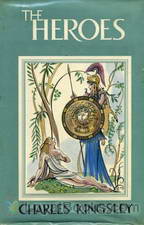 The Heroes, or Greek Fairy Tales for my Children
The Heroes, or Greek Fairy Tales for my Children
The Heroes, or Greek Fairy Tales for my Children by Charles Kingsley is a collection of three Greek mythology stories: Perseus, The Argonauts, and Theseus. The author had a great fondness for Greek fairy tales and believed the adventures of the characters would inspire children to achieve higher goals with integrity. | |
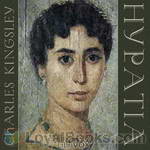 Hypatia
Hypatia
Charles Kingsley (June 12 1819 - January 23 1875) was an English divine, university professor, historian, and novelist, particularly associated with the West Country and north-east Hampshire. As a novelist, his chief power lay in his descriptive faculties, which are evident in this novel as he pictures the Egyptian desert and the ancient city Alexandria. Hypatia, 1st published in 1853, is set in 5th Century A.D. Egypt. It centers upon a young orphan monk from a desert monastery who feels called to continue his religious life in the city... | |
By: Charles Klein (1867-1915) | |
|---|---|
 The Music Master Novelized from the Play
The Music Master Novelized from the Play
| |
By: Charles Knight (1791-1873) | |
|---|---|
 Mind Amongst the Spindles
Mind Amongst the Spindles
Lowell Massachusetts was founded in the 1820s as a planned manufacturing center for textiles and is located along the rapids of the Merrimack River, 25 miles northwest of Boston. By the 1850s Lowell had the largest industrial complex in the United States. The textile industry wove cotton produced in the South. In 1860, there were more cotton spindles in Lowell than in all eleven states combined that would form the Confederacy. Mind Amongst the Spindles is a selection of works from the Lowell Offering, a monthly periodical collecting contributed works of poetry and fiction by the female workers of the textile mills... | |
By: Charles L. Fontenay | |
|---|---|
 Rebels of the Red Planet
Rebels of the Red Planet
Dark Kensington had been dead for twenty-five years. It was a fact; everyone knew it. Then suddenly he reappeared, youthful, brilliant, ready to take over the Phoenix, the rebel group that worked to overthrow the tyranny that gripped the settlers on Mars.The Phoenix had been destroyed not once, not twice, but three times! But this time the resurrected Dark had new plans, plans which involved dangerous experiments in mutation and psionics.And now the rebels realized they were in double jeopardy.... | |
By: Charles Lamb | |
|---|---|
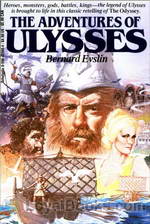 The Adventures of Ulysses
The Adventures of Ulysses
In The Adventures of Ulysses, Charles Lamb re-tells the story of Ulysses’s journey from Troy to his own kingdom of Ithaca. The book uses Homer’s The Odyssey as the basis for the story, but it isn’t a direct translation of the Greek classic. The book is considered a modern version of the epic tale when it was published in 1808. In the preface of the book, Lamb said that he made the narration of the story faster so that more readers would be attracted to it. To begin with, Homer’s Odyssey is already a classic and in re-telling this story, Charles Lamb aimed to make this epic poem more comprehensible to the average person... | |
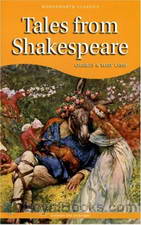 Tales from Shakespeare
Tales from Shakespeare
This little gem of a book was probably the first introduction to Shakespeare that most readers have had as children. Tales from Shakespeare was written in 1807 by a young clerk called Charles Lamb in the offices of the East India Company. Lamb co-authored them with his beloved sister Mary. The pair lived together for life, having gone through immense trauma caused by mental illness and tragedy. However, far from being a melancholy duo, they led an active and ample social life in the company of some of the literary greats of the Romantic movement of the 19th century... | |
 A Masque of Days From the Last Essays of Elia: Newly Dressed & Decorated
A Masque of Days From the Last Essays of Elia: Newly Dressed & Decorated
| |
By: Charles Louis Fontenay (1917-2007) | |
|---|---|
 Service with a Smile
Service with a Smile
| |
 The Gift Bearer
The Gift Bearer
| |
 Wind
Wind
| |
By: Charles M. Snyder | |
|---|---|
 The Flaw in the Sapphire
The Flaw in the Sapphire
| |
By: Charles Mackay (1814-1889) | |
|---|---|
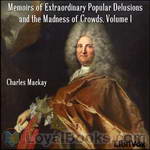 Memoirs of Extraordinary Popular Delusions and the Madness of Crowds
Memoirs of Extraordinary Popular Delusions and the Madness of Crowds
The book chronicles and vilifies its targets in three parts: “National Delusions”, “Peculiar Follies”, and “Philosophical Delusions”.The subjects of Mackay’s debunking include alchemy, beards (influence of politics and religion on), witch-hunts, crusades and duels. Present day writers on economics, such as Andrew Tobias, laud the three chapters on economic bubbles. | |
By: Charles Major (1856-1913) | |
|---|---|
 When Knighthood Was in Flower
When Knighthood Was in Flower
Set during the Tudor period of English history, When Knighthood Was in Flower tells the tribulations of Mary Tudor, a younger sister of Henry VIII of England who has fallen in love with a commoner. However, for political reasons, King Henry has arranged for her to wed King Louis XII of France and demands his sister put the House of Tudor first, threatening, "You will marry France and I will give you a wedding present – Charles Brandon's head!" | |
 A Forest Hearth: A Romance of Indiana in the Thirties
A Forest Hearth: A Romance of Indiana in the Thirties
| |
By: Charles McRae | |
|---|---|
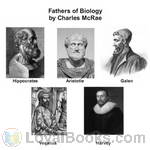 Fathers of Biology
Fathers of Biology
An account given of the lives of five great naturalists (Hippocrates, Aristotle, Galen, Vesalius and Harvey) will not be found devoid of interest. The work of each one of them marked a definite advance in the science of Biology. There is often among students of anatomy and physiology a tendency to imagine that the facts with which they are now being made familiar have all been established by recent observation and experiment. But even the slight knowledge of the history of Biology, which may be obtained from a perusal of this little book, will show that, so far from such being the case, this branch of science is of venerable antiquity... | |
By: Charles Monroe Sheldon (1857-1946) | |
|---|---|
 In His Steps
In His Steps
In His Steps takes place in the railroad town of Raymond. The main character is the Rev. Henry Maxwell, pastor of the First Church of Raymond, who challenges his congregation to not do anything for a whole year without first asking: “What Would Jesus Do?” (taken from Wikipedia) | |
By: Charles Moreton | |
|---|---|
 The Maid and the Magpie An Interesting Tale Founded on Facts
The Maid and the Magpie An Interesting Tale Founded on Facts
| |
By: Charles Morris | |
|---|---|
 Historic Tales
Historic Tales
Historical Tales, The Romance of RealityBy CHARLES MORRISPREFACE.It has become a commonplace remark that fact is often stranger than fiction. It may be said, as a variant of this, that history is often more romantic than romance. The pages of the record of man's doings are frequently illustrated by entertaining and striking incidents, relief points in the dull monotony of every-day events, stories fitted to rouse the reader from languid weariness and stir anew in his veins the pulse of interest in human life... | |
By: Charles Neufeld (1856-1918) | |
|---|---|
 Under the Rebel's Reign
Under the Rebel's Reign
| |